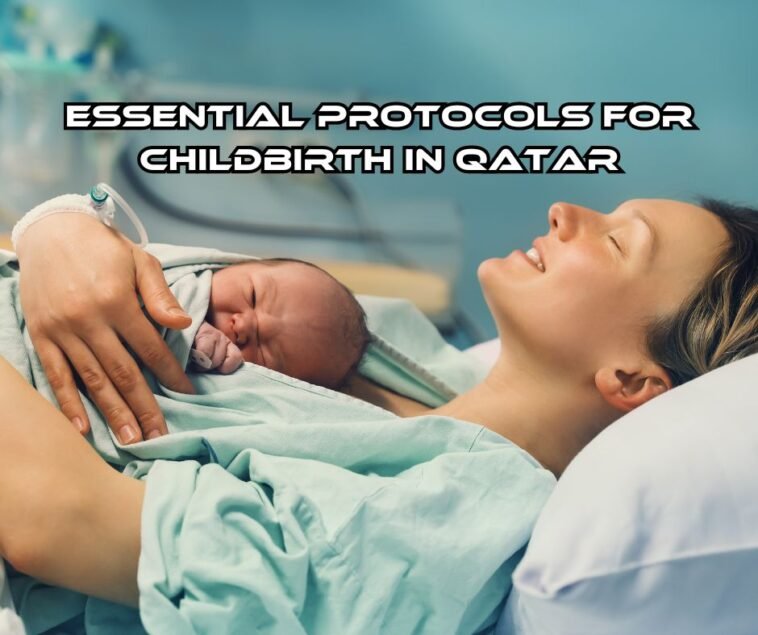For expatriate parents or expectant mothers seeking guidance on childbirth protocols in Qatar, here is a consolidated resource with all the essential information you need to know.
Table of Contents
- Rules for giving birth in Qatar
- Hamad Medical Corporation’s Offered Services
- Giving birth in Qatar
- What should be expected when you go to a hospital?
- Baby Vaccination List
- Issuance of Birth Certificate and Citizenship for Children Born in Qatar
- Wellbeing Card in Qatar
- FAQs About Giving Birth in Qatar
- What are the procedures for giving birth in Qatar?
- Are newborn screening tests available in Qatar?
Rules for giving birth in Qatar
In Qatar, one of the primary requirements for delivering a child is that, as per Qatari legislation, the mother must be married.
Choosing to give birth in Qatar is a favorable decision for expatriate parents-to-be, as the country provides excellent care options with a variety of top-tier clinics and hospitals that ensure a smooth birthing experience. Qatar boasts a range of public and private healthcare facilities, making it convenient for you to find a hospital and healthcare provider that aligns with your preferences.
Expats seeking maternity services in Qatar should first review their insurance policies to identify hospitals that offer the services they require, especially if they have a preference for a private facility among the diverse public and private hospitals and clinics available. It is essential to choose a hospital or clinic that accepts your insurance coverage and fulfills all your pregnancy-related needs throughout every stage of the childbirth process.
Hamad Medical Corporation’s Offered Services
Hamad Medical Corporation (HMC) and its associated hospitals stand as a top choice for many women in Qatar when it comes to childbirth. The corporation is renowned for providing exceptional care to pregnant women and new mothers, offering a comprehensive range of maternity, delivery, and post-delivery services. The Women’s Wellness and Research Centre, Qatar’s largest tertiary hospital specializing in women’s healthcare, delivers a wide array of clinical services that cater to women’s needs from preconception all the way through childbirth, postnatal care, and beyond.
Giving birth in Qatar
During your delivery, it is vital to have confirmed all procedures and your birthing plan with your healthcare provider in advance. This plan should encompass details such as who is allowed in the delivery room, whether you are opting for a natural birth or a C-section, and the anticipated length of your post-delivery stay.
Ensure you have the following documents with you:
- Qatar ID
- Wellbeing Card
- Insurance Card
- Visa
- Marriage Certificate
Having these documents readily available will help streamline the admission process and ensure that you receive the necessary care and services during your childbirth experience in Qatar.
What should be expected when you go to a hospital?
Upon confirming your pregnancy, the journey through prenatal care and childbirth in Qatar typically involves the following steps:
- Initial Confirmation: Visit the health center indicated by your health card or consult a doctor for a blood test to confirm your pregnancy.
- Prenatal Care: Receive regular scans and appointments based on your doctor’s recommendations, possibly leading to a referral to a specialist at Hamad Medical Corporation after six months.
- Gestational Diabetes Test: Undergo a Gestational Diabetes Test at Hamad Medical Corporation as part of routine care.
- Antenatal Preparation: Around 38 weeks into pregnancy, a tentative delivery date is provided.
- Delivery: Procedures during delivery may vary across hospitals. While most public hospitals may restrict husbands from being present during delivery, some like Sidra Hospital allow their presence during both natural births and C-sections.
- Post-Delivery Care: After childbirth, mother and baby are typically moved to a room. Depending on their condition, they may be discharged within a day or two in public hospitals.
- Costs and Benefits: Hamad Medical Corporation offers treatment free of charge, with some exceptions like additional scans and room charges post-delivery. A logbook provided after childbirth covers the baby’s medical expenses until they turn one.
- Newborn Screening: Take advantage of Hamad Medical Corporation’s newborn screening test for early detection of potential diseases and disorders in newborns.
Following your doctor’s postnatal care advice and utilizing Qatar’s healthcare initiatives can ensure a smooth transition into motherhood and the well-being of both you and your newborn.
Baby Vaccination List
Qatar follows the vaccine schedule recommended by the World Health Organization, tailored to the child’s age. A comprehensive set of 12 vaccines is typically administered to children from birth up to 12 years of age. These vaccines include:
- Bacille Calmette-Guerin
- Hepatitis B
- Hexavalent
- Pentavalent
- Poliomyelitis
- Influenza Type B
- Rotavirus
- Oral Polio
- MMR (Measles, Mumps, Rubella)
- Varicella (Chickenpox)
- Hepatitis A
By adhering to this vaccination schedule, children in Qatar are provided with essential immunizations to safeguard their health and well-being against a range of preventable diseases.
Know about the timetable of an ideal vaccination for your child here: https://eservices.moph.gov.qa/NIP/En/schfybaby.jsp
Issuance of Birth Certificate and Citizenship for Children Born in Qatar
The Ministry of Public Health (MoPH) issues birth certificates for all children born in Qatar. However, children born to non-Qatari parents do not automatically receive Qatari citizenship. Expatriate parents must register their child’s birth with their embassy and get a passport. Not all embassies provide this service, so parents should verify the procedures.
Regarding birth certificate issuance, here are the key updates from MoPH:
- Births are electronically registered by the registration department.
- E-certificates are typically issued within 60 minutes.
- The cost for each birth certificate copy is QR 20.
- New births must be reported to authorities within 15 days.
For further information on the required documents and procedures for obtaining a birth certificate in Qatar, please click on the following link: http://qatarjust.com/do-you-know-the-process-to-get-birth-certification-in-qatar/
The application for the habitation to grant for an infant must be submitted within 60 days from the
Wellbeing Card in Qatar
Getting a health card in Qatar is advisable for citizens and residents as it grants access to discounted healthcare services at HMC’s medical facilities. Although consultations or non-emergency treatments may involve extra fees, possessing a valid health card can help reduce the overall expenses. Expatriates are also encouraged to acquire a health card to access public hospitals and health centers. The price of a health card is QR 100, offering reduced rates for doctor consultations, medications, and treatments at public healthcare institutions.
You can apply for a health card by following the instructions provided in this link: https://www.hamad.qa/EN/Patient-Information/How-To-Get-A-Health-Card/Pages/default.aspx.
If you are an expat who has given birth in Qatar, we would love to hear about your experience. Please share your thoughts and comments below. Also, don’t forget to share this article with others as it helps to keep us motivated!
FAQs About Giving Birth in Qatar
What are the options for giving birth in Qatar?
Answer: In Qatar, women can choose to give birth at a public hospital or a private hospital.
What are the procedures for giving birth in Qatar?
Answer: It is crucial to discuss your birthing plan with your doctor before delivery, outlining factors such as who will be present during the birth, the planned method of delivery (natural or C-section), and the anticipated duration of hospitalization. Following childbirth, postnatal care and ensuring the baby receives necessary vaccinations are essential measures to prioritize for the child’s well-being.
Are newborn screening tests available in Qatar?
Answer: Yes, the Hamad Medical Corporation (HMC) offers newborn screening tests for the early diagnosis of diseases and disorders in babies.
How can expat parents obtain a birth certificate for their child born in Qatar?
Answer: Foreign parents are required to register their child’s birth at their embassy and secure a passport for the newborn. It is crucial to submit the application for the infant’s residence permit within 60 days of the baby’s birth to comply with the regulations.
How can I get a health card in Qatar?
Answer: Qatari citizens and residents have the option to apply for a health card, enabling them to utilize healthcare services at HMC facilities and hospitals. Expatriates are similarly recommended to obtain a health card for entry to public hospitals and health centers. The price for a health card stands at QR 100.
Please Subscribe Us to get updated with Qatar News, Saudi News, Kuwait News, Health News, UAE News, Iqama, Visa, Jobs, Banking and More..



